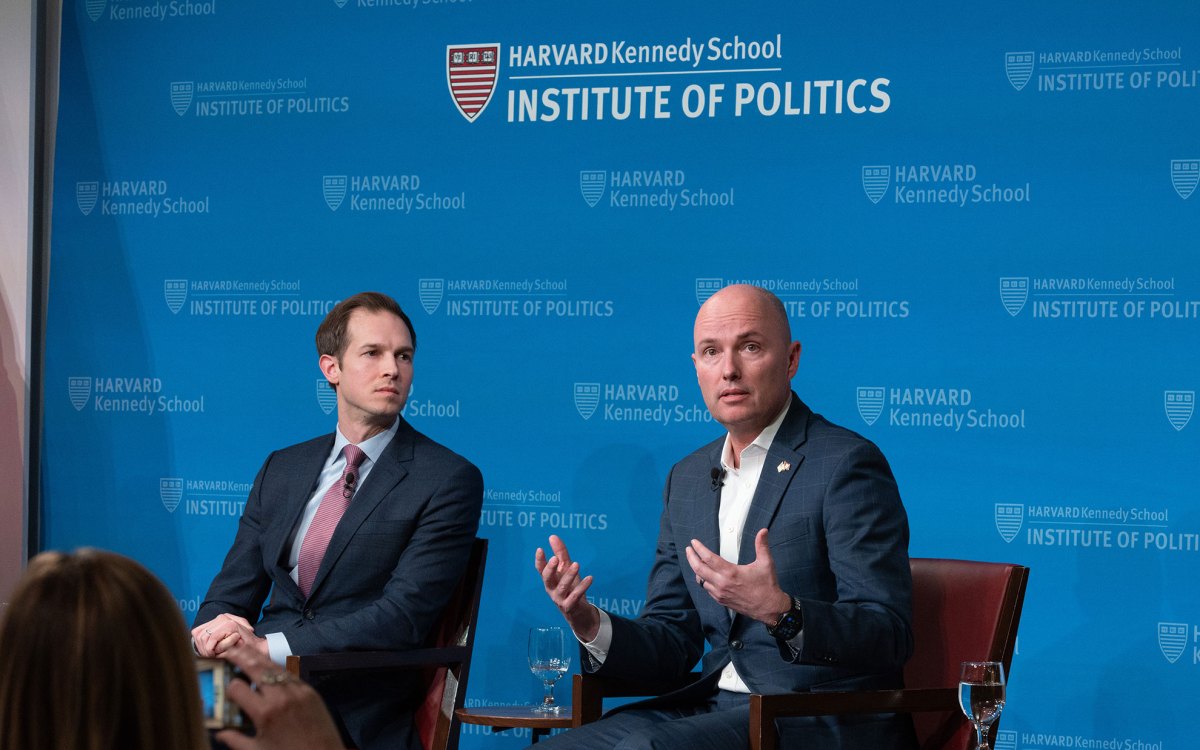Candidates’ advisers talk health policy
McCain and Obama plans agree on some points, but not many
With an estimated 47 million Americans lacking health insurance, the subject of health care in the next administration has taken center stage as presidential nominees John McCain and Barack Obama approach election day. Senior health care advisers to both nominees hashed out the similarities and differences between the candidates’ stances at a jam-packed “great debate” at the Harvard School of Public Health (HSPH) last week (Sept. 12) that filled Snyder Auditorium, two overflow rooms, and part of the Kresge Cafeteria.
The two speakers — David Cutler, who advises Democratic nominee Obama, and Gail Wilensky, who advises Republican nominee McCain — are both health care economists. They said that the candidates agree on several strategies aimed at lowering the cost of medical care in the United States — including beefing up information technology, paying more attention to preventive care, and improving the evaluation of quality and cost-effectiveness — but added that the nominees’ ideas for helping to cover the uninsured and underinsured are sharply different.
Obama would retain the current employer-based health insurance system, while McCain would allow individuals to continue purchasing employer-sponsored plans with a new refundable credit or use the credit to purchase insurance that better suits their needs.
“Sen. Obama says we should build on what works, not tear it down,” said Cutler, Otto Eckstein Professor of Applied Economics at the Faculty of Arts and Sciences (FAS), in his opening remarks.
Obama’s goal, said Cutler, is to insure 98 to 99 percent of all Americans, in part by using money saved by repealing the Bush tax cuts on the wealthy to offer federal subsidies to low- and middle-income residents to help them buy coverage. But the system would continue to be employer-based for most Americans.
To make sure individuals get the coverage they need, Cutler said, the Obama plan would prohibit insurers from denying applicants based on pre-existing conditions.
The Obama plan would mandate that all children be covered, but the Democrat would only seek to force all adults to get insurance if the voluntary approach were to fail, Cutler said.
“You have to make it affordable and accessible. Once you do that, the vast majority will get coverage,” he said.
Obama would also mandate that all businesses — except for small ones — offer coverage, or pay an assessment that would help people buy insurance through either a private plan or a new government program similar to Medicare, if they are unable to get coverage through their employers.
By contrast, McCain seeks to focus on strategies that will slow spending growth and give patients more choices to buy the health care plans that meet their needs, said Wilensky. McCain proposes to reform the tax code so that families will receive a refundable credit of $5,000 ($2,500 for individuals), which they can use to help pay for their employer-sponsored plan or to buy any other plan.
That would allow Americans to continue buying their employer’s plans because most large and midsize employers would likely continue to offer coverage to attract good workers, said Wilensky. But importantly, she added, McCain’s approach would help people purchase insurance from vendors other than just where an individual works.
“If you tie insurance to employers, in a mobile labor economy, you are ensuring disruption,” Wilensky said. She added that this linkage also tends to hide the expense of coverage and pushes up costs, which is the single biggest driver of increased numbers of uninsured.
Offsetting the new refundable credit, employees would be required to include any employer contributions to their health plans as part of their taxable income.
McCain also proposes creating a national insurance market to make insurance more competitive. People would be able to cross state lines to buy their insurance, and individuals and small businesses could use any association or organization to purchase their insurance. This would provide more choice, Wilensky said, because benefit coverage varies from state to state.
McCain would not mandate insurers to offer plans to those with pre-existing conditions, Wilensky said. Instead, he proposes federal funding to help states establish pools to insure those with high medical costs, because such individuals may not be able to get insurance on their own or only at a very high price.
While Obama has set a goal of insuring 98 to 99 percent of Americans, Wilensky said McCain’s objective has not been framed that way. His objective is to provide a financial means so that people can buy insurance and give them access to lower-cost insurance, she said.
Despite disagreement on the way health insurance should be made available, both economists said that they are optimistic that progress can be made in the next Congress, no matter who wins the White House, if a true bipartisan effort is made.
“We have to learn to grab the opportunities,” Wilensky said, adding that McCain’s plan, in contrast to some past Republican efforts, “is a very serious proposal.”
Cutler agreed that it will take a bipartisan effort. “I see a lot of interest across the country, from both Democrats and Republicans,” he said.
But both advisers made it clear that the key to solving the problem of the uninsured ultimately rests on reducing the cost of care.
“We need a radical transformation of the system,” Cutler said.
Both advisers noted that improving information technology will free health care providers to spend more time on patient care rather than on paperwork.
Also important, they agreed, is the ability to establish the effectiveness of expensive medical procedures.
In addition, public health programs must focus on reducing obesity and smoking, the two agreed.
Implementing efforts such as these and others could reduce the cost of care by $2,500 per family per year, Cutler said.
“The Great Debate: Health Care in the Next Administration — Obama vs. McCain” was sponsored by HSPH and the New England Journal of Medicine (NEJM). The debate was moderated by Arnold Epstein, chair of the HSPH Department of Health Policy and Management and an editor at NEJM. Panelists were Karen Davis, president, Commonwealth Fund; Jon Kingsdale, executive director, Commonwealth Connector; and Thomas Lee, network president, Partners HealthCare. A Webcast of the debate will be available on the NEJM Web site.




